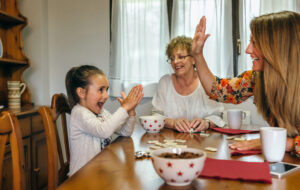As a psychologist for more than 3 decades and having worked with amazing children and caregivers, I believe strongly that all people are born good and there are no bad babies. This is a social learning perspective I hold. Children are introduced into this world via the experiences from parents and other humans. Parenting is an amazing opportunity for us to utilize positive and successful techniques to help our little one grow up into an adult that likes themselves, others and the world and that as parents, we can ultimately respect and admire.
An important parenting strategy for child development is praise. Praise can be defined as positive verbal evaluations of a child’s behaviour. Often it is used with other positive parenting strategies like warmth and responsiveness (Swenson et al., 2016). Praise can be used as a parent strategy, as it is important for child development. The strategy has various factors that determine its effectiveness, so as parents we have to understand how to use it to ours and our child’s advantage. There is a lot of research and longitudinal evidence that supports the use of praise as an effective parenting strategy. It does not mean that we are praising the behaviors we don’t want to see in our children, It means we are only praising behaviors that compliment the child’s growth towards our parenting goals. I have never met a parent who wants their child to grow up with poor self image or aggression or anti-social behaviours. It is simply often lack of understanding and education around parenting techniques that prevent parents using praise as their primary parenting tool and they may overuse punishment instead. I know sometimes parents are stinting with praise because they don’t want their kids to have swelled heads but don’t worry, the effective use of praise will not do this. The true aim of praise is to have successful and permanent positive behaviours in our kids and it really does go a long way to achieving this goal.
“Praise” as a parenting strategy is used by many parents in the world successfully. I mean we, as adults, understand that we like to be seen as doing a good job, just like children want to be seen the same way by us, caregivers/parents and praise is important for childhood development also. The use of praise is a way in which children can become aware of their caregivers/parents’ values and beliefs (Gunderson et al., 2013). When used effectively, praise can help parents foster their children’s self-esteem by bringing attention to their hard work. This can lead to higher persistence and resilience in situations kids find challenging (Brummelman & Sedikides, 2020). Parents can use praise for various reasons. In a behavioural sense, praise is used as positive reinforcement, in line with old Psychological research by Skinner’s (1950). Basically with kids if parents constantly and consistently verbally approve their child’s positive behaviour, (the behaviour in the child that the parents most desire) they will likely repeat this behaviour in the future (Leijten et al., 2016).
Quite simply praise gives kids an idea of the desired behaviour the parents want as opposed to punishment which does not give the child the positive reinforcement for the behaviour the parent wants. Parents also use it to help increase their child’s confidence. Because of these reasons, praise is considered an indication of positive parenting (Swenson et al., 2016), which is how many parents strive to raise their children isn’t it?. Like I said before, no parent I have met sets out intentionally to cause any long term issues in their child’s self esteem, more than likely it is a lack of understanding as to how and why the use of praise is important that parents then opt out of using this model. It may be how they were raised themselves, so they don’t believe praise is important. There may be other reasons also, but we know when praise is used effectively it can lead to positive behaviours in children.
It is important to note for praise to be an effective strategy parents must do several things. It needs to be a positive verbal evaluation of a child’s specific behaviour or traits (Brummelman et al., 2022) and can be used in several forms. Praise is only ever positive, but it can be ‘labelled’ or ‘unlabelled’. Labelled praise is when the parent’s words explicitly refers to the praised behaviour, such as “Great job putting your plate away”, whereas unlabelled does not specify the behaviour, such as if the parent saw the child put their plate away and said “Good job” said directly as the child is completing the task. Although there are differences between labelled and unlabelled praise, recent literature has found that both are great techniques and are successful (Leijten et al., 2016) in helping a child learn as to ‘what is the behavior my parents want me to do?’.
So to sum up, praise is an important parenting strategy. It assists in overall positive child development as it reinforces the positive or desired behaviour in children. It is a simple strategy for parents to use and it is greatly supported by past research and it has overall positive effects on childhood development. Don’t worry if you are not perfect at it, just start by noticing your child’s behaviour you like by using words to describe their action and that you are happy about it. In the end all children want deep down is to please their parents just like most of us as adults want to please our bosses. Praise does not mean you are a passive parent, praise in fact is a learning tool for kids to understand us better as their parents! Good luck parents, as parenting can be a hard job at times ?
*please note the use of term parent also includes primary caregivers that may not be a parent.
Kelli is a psychologist with many years of experience, she sees children from 14+, adolescents and adults. To make an appointment with Kelli, book online or ring Vision Psychology Wishart on 07 3088 5422.
References
Brummelman, E., Grapsas, S., & Van Der Kooij, K.. (2022). Parental praise and children’s exploration: a virtual reality experiment. Scientific Reports, 12(1). https://doi.org/10.1038/s41598-022-08226-9
Brummelman, E., & Sedikides, C.. (2020). Raising Children With High Self?Esteem (But Not Narcissism). Child Development Perspectives, 14(2), 83–89. https://doi.org/10.1111/cdep.12362
Gunderson, E. A., Gripshover, S. J., Romero, C., Dweck, C. S., Goldin-Meadow, S., & Levine, S. C.. (2013). Parent Praise to 1- to 3-Year-Olds Predicts Children’s Motivational Frameworks 5 Years Later. Child Development, 84(5), 1526–1541. https://doi.org/10.1111/cdev.12064
Leijten, P., Thomaes, S., Orobio De Castro, B., Dishion, T. J., & Matthys, W.. (2016). What good is labeling what’s good? A field experimental investigation of parental labelled
praise and child compliance. Behaviour Research and Therapy, 87, 134–141. https://doi.org/10.1016/j.brat.2016.09.008
Skinner, B. F. (1950). Are theories of learning necessary? Psychological Review, 57(4), 193–216. https://doi.org/10.1037/h0054367
Swenson, S., Ho, G. W. K., Budhathoki, C., Belcher, H. M. E., Tucker, S., Miller, K., & Gross, D.. (2016). Parents’ Use of Praise and Criticism in a Sample of Young Children
Seeking Mental Health Services. Journal of Pediatric Health Care, 30(1), 49–56. https://doi.org/10.1016/j.pedhc.2015.09.010



